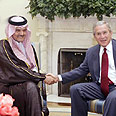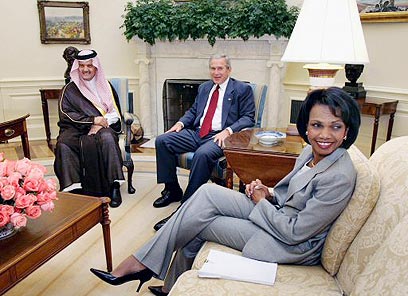
Top Saudi Arabian officials pressed President George W. Bush on Sunday to agree to seek a ceasefire in the conflict between Israel and Hizbullah guerrillas in southern Lebanon.
“We requested a ceasefire to allow for the cessation of hostilities, to allow for the rebuilding of the forces of Lebanon,” Saudi Foreign Minister Prince Saud al-Faisal told reporters in English after a meeting of more than an hour with Bush and US Secretary of State Condoleezza Rice.
Bush has resisted calling for an immediate ceasefire, saying Israel has the right to defend itself and a cessation of hostilities must address the root causes of the conflict, including Hizbullah’s attacks on Israel and abduction of Israeli soldiers.
Accused by some Democrats of moving too slowly on the crisis, Rice departed Sunday evening for Israel and the Palestinian territories and will go to Rome on Wednesday to discuss the crisis with European and Arab officials, including officials from Lebanon.
Speaking in Arabic, Saud said he brought a letter to Bush from Saudi King Abdullah seeking ways to end the bloodshed in Lebanon. The Saudis had requested the meeting with Bush.
Saud said the letter called for an immediate ceasefire, the start of a prisoner exchange between Hizbullah and Israel and delaying the dismantling of Hizbullah for now. The Saudis did not object to an international force deployed in southern Lebanon.
Saudis troubled by Israeli attacks on Lebanon
Saud said a ceasefire would allow time for Lebanon to build up its forces and establish its sovereignty over all of Lebanon. He said he found Bush “Very conscious of the destruction and the bloodshed that the Lebanese are suffering, and his anxiety to see a cessation of hostilities.”

Seeking end to violence. White House meeting (Photo: AP)
“There is only one problem, and that is Lebanon, the inability of Lebanon to exercise its sovereignty over its territory. This is what we both agreed is the primary concern of everybody,” Saud said in English.
He declined to go into further details. “I’m not going to say anything or be pushed into saying anything to prejudice the secretary’s trip and the negotiations she is going to undertake,” he said.
International calls for a cease-fire have increased as fighting between Israel and Hizbullah guerrillas has intensified, but Washington has rejected that approach. Rice has said she is seeking a sustainable end to violence.
'Immediate ceasefire without political solution useless'
US ally Saudi Arabia has criticized Hizbullah and its backer Iran, saying “Elements” and “Those behind them” were responsible for the Israeli offensive. But the Saudis have also been troubled by the Israeli attacks on Lebanon and their toll on civilians.
Bush and Rice met at the White House with Saud, Prince Bandar bin Sultan, head of Saudi Arabia’s national security council, and Saudi ambassador to the United States, Prince Turki al-Faisal.
Rice is scheduled to meet Israeli Prime Minister Ehud Olmert and Palestinian President Mahmoud Abbas but has no plans to meet officials from either Hizbullah or its backer Syria.
Anxious not to raise expectations, Rice has made clear her diplomatic work in the Middle East will not be easy and has stressed the United States sees an immediate ceasefire without a political solution as useless.
“What I won’t do is go to some place and try to get a cease-fire that I know isn’t going to last,” Rice said on Friday when she announced her visit.
After talks with Olmert and Abbas, Rice will leave for Rome where the so-called Lebanon core group is holding talks to try and resolve the crisis between Hizbullah guerrillas, Lebanon and Israel.
Rice said the United States endorsed an international force for southern Lebanon but she said it would have to be “Robust” and would exclude US forces.















